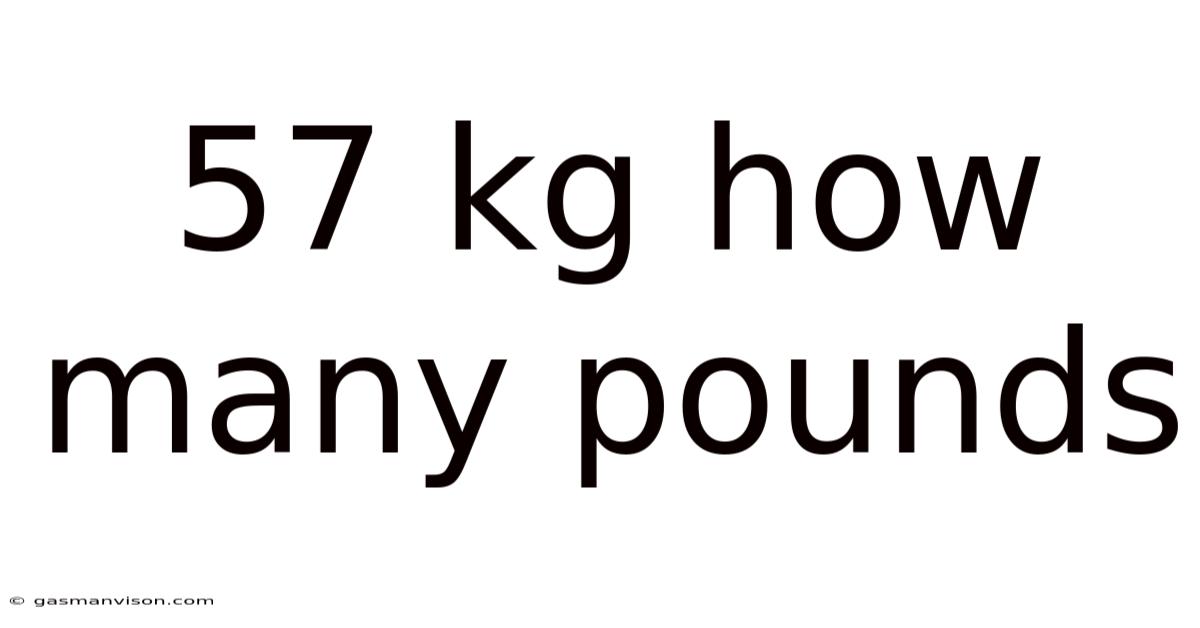57 Kg How Many Pounds
gasmanvison
Sep 15, 2025 · 4 min read

Table of Contents
57 kg How Many Pounds? A Comprehensive Guide to Weight Conversions and More
Are you wondering how many pounds are in 57 kilograms? This question pops up frequently, whether you're traveling internationally, adjusting recipes from metric to imperial measurements, or simply trying to understand your weight in different units. This comprehensive guide will not only answer that question directly but will also delve into the intricacies of weight conversions, providing you with the tools and knowledge to handle similar conversions effortlessly. Understanding the relationship between kilograms and pounds is a valuable skill with applications in various fields, from cooking and fitness to international trade and scientific research.
Understanding Kilograms and Pounds:
Kilograms (kg) and pounds (lbs) are both units of mass, but they belong to different systems of measurement. Kilograms are the standard unit of mass in the International System of Units (SI), also known as the metric system. Pounds, on the other hand, are part of the imperial system of measurement, predominantly used in the United States and a few other countries. The difference lies in their origins and the standards used to define them. Understanding this fundamental difference is crucial for accurate conversions.
The Conversion Factor: Unlocking the Secret to Accurate Conversions
The key to converting between kilograms and pounds lies in the conversion factor. One kilogram is approximately equal to 2.20462 pounds. This means that to convert kilograms to pounds, you simply multiply the number of kilograms by 2.20462. Conversely, to convert pounds to kilograms, you divide the number of pounds by 2.20462.
57 kg to Pounds: The Calculation
Now, let's answer the central question: how many pounds are in 57 kilograms?
To find out, we use the conversion factor:
57 kg * 2.20462 lbs/kg ≈ 125.66 lbs
Therefore, 57 kilograms is approximately equal to 125.66 pounds.
Rounding and Precision:
It's important to note that the conversion factor we used is an approximation. For most everyday purposes, rounding to one or two decimal places is sufficient. However, for scientific or highly precise applications, using the full conversion factor is recommended. In this instance, rounding to two decimal places gives us 125.66 pounds, which is accurate enough for most practical situations.
Beyond the Basic Conversion: Exploring Related Concepts
While knowing the conversion between 57 kg and pounds is helpful, let's expand our understanding to encompass related concepts and techniques that will enhance your ability to handle various weight conversions with confidence.
Working with Different Weight Units:
The metric system offers a range of units beyond kilograms, including grams (g), milligrams (mg), and tonnes (t). The imperial system also includes ounces (oz), stones (st), and tons (tn). Understanding the relationships between these units is vital for comprehensive weight conversion mastery.
- Kilograms to Grams: 1 kg = 1000 g
- Grams to Kilograms: 1 g = 0.001 kg
- Pounds to Ounces: 1 lb = 16 oz
- Ounces to Pounds: 1 oz = 0.0625 lb
These relationships provide a foundation for converting between various units within each system. For example, to convert 57 kg to grams, you would simply multiply by 1000, resulting in 57,000 grams.
Practical Applications of Weight Conversions:
Weight conversions are crucial in numerous scenarios:
- International Travel: Understanding weight restrictions for luggage on airlines often involves converting between kilograms and pounds.
- Cooking and Baking: Many recipes use different units of measurement. Converting between metric and imperial units is essential for accurate results.
- Fitness and Health: Tracking weight loss or gain often involves converting between kilograms and pounds, especially when comparing data from different sources.
- Shipping and Logistics: Calculating shipping costs often requires converting weights between different systems.
- Scientific Research: Converting weights between units is crucial for consistency and accuracy in scientific experiments and data analysis.
Utilizing Online Conversion Tools:
Many online tools can perform weight conversions quickly and accurately. These calculators often handle a wide range of units, simplifying the conversion process. However, it's crucial to understand the underlying principles of conversion, even when using these tools. This allows you to verify results and identify potential errors.
Avoiding Common Mistakes in Weight Conversions:
While the process seems straightforward, some common errors can occur:
- Incorrect Conversion Factor: Using the wrong conversion factor will lead to inaccurate results.
- Unit Mismatches: Failing to check the units carefully before converting can lead to mistakes.
- Rounding Errors: Excessive rounding can introduce inaccuracies, especially in precise applications.
Conclusion:
We've answered the initial question: 57 kg is approximately 125.66 lbs. However, the true value lies in understanding the broader context of weight conversions, encompassing the underlying principles, related units, and practical applications. Mastering these skills allows you to confidently navigate the world of weights and measures, regardless of the units involved. Whether you're dealing with luggage restrictions, baking a cake, or analyzing scientific data, a solid grasp of weight conversions is an invaluable asset. Remember to always double-check your work and use appropriate rounding to ensure accuracy in your calculations. With practice and a thorough understanding of the conversion process, you'll become proficient in handling various weight conversion challenges.
Latest Posts
Latest Posts
-
Lewis Dot Structure For Icl5
Sep 15, 2025
-
What Is 20 Of 720
Sep 15, 2025
-
Whats 48 Inches In Feet
Sep 15, 2025
-
Cable Tray Is Covered In
Sep 15, 2025
-
Alice Correa Bought Three Yards
Sep 15, 2025
Related Post
Thank you for visiting our website which covers about 57 Kg How Many Pounds . We hope the information provided has been useful to you. Feel free to contact us if you have any questions or need further assistance. See you next time and don't miss to bookmark.